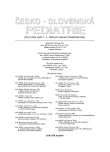-
Medical journals
- Career
Teratogenic Phenylketonuria-related Embryopathy
Authors: E. Seemanová
Authors‘ workplace: Oddělení klinické genetiky Ústavu biologie a lékařské genetiky UK 2. LF, Praha vedoucí MUDr. M. Havlovicová
Published in: Čes-slov Pediat 2007; 62 (2): 108-110.
Category: The current Case
Overview
Newborn screening of inborn errors of metabolism leads to the early diagnosis of autosomal recessive phenylketonuria and normal development of affected homozygotes due to dietary therapy. Patients with classic symptomatology of phenylketonuria are nowadays forty years old and older. The treated patients show normal mental development, are married and have children. The children of female patients develop normally if the women return to the strong low phenylalanine diet at least 3 months before the conception, and their serum level of phenylalanine is regularly controlled in pregnancy. The case of a boy with severe congenital microcephaly, etiology of which was recognized only at the age of 10 months, shows that teratogenic phenylketonuria-related embryopathy should be kept in mind, especially because it is fully preventable.
Key words:
congenital microcephaly, mental retardation, teratogenic embryopathy, phenylketonuria disorder of brain in heterozygote
Labels
Neonatology Paediatrics General practitioner for children and adolescents
Article was published inCzech-Slovak Pediatrics

2007 Issue 2-
All articles in this issue
- Teratogenic Phenylketonuria-related Embryopathy
- Changes in Iodine Supplementation after Eradication of Iodine Deficit and Their Possible Causes. A Randomized Study of Children Population in Two Regions of the Czech Republic with a Time Lapse of 5 Years. First Publication of the Results
- Bone Marrow Transplantation in Children – Parents’ Point of View
- Bone Marrow Transplantation in Children – Medical Staff Point of View
- Multiple Intracranial Complications of Pansinusitis in Children
- Continual Monitoring of Electric Brain Activity in Newborns (aEEG – Amplitude Integrated EEG)
- Heart Rate Variability in Neonatal Period
- Czech-Slovak Pediatrics
- Journal archive
- Current issue
- Online only
- About the journal
Most read in this issue- Multiple Intracranial Complications of Pansinusitis in Children
- Continual Monitoring of Electric Brain Activity in Newborns (aEEG – Amplitude Integrated EEG)
- Bone Marrow Transplantation in Children – Parents’ Point of View
- Teratogenic Phenylketonuria-related Embryopathy
Login#ADS_BOTTOM_SCRIPTS#Forgotten passwordEnter the email address that you registered with. We will send you instructions on how to set a new password.
- Career

